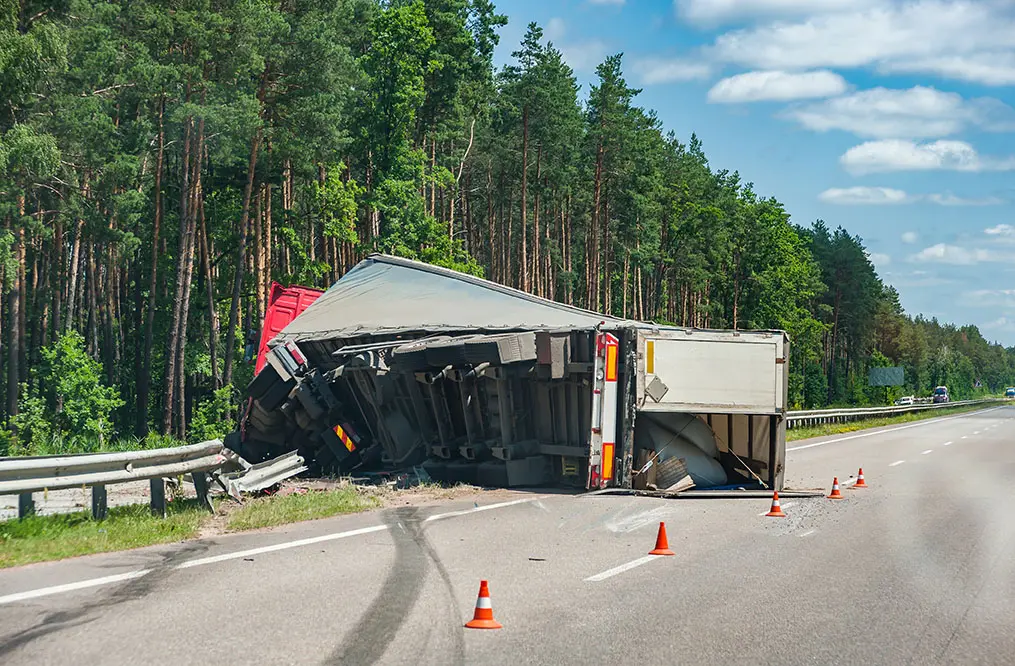When is the Trucking Company Liable?
Know what criteria and laws fault trucking companies as the guilty party in a truck accident
If you or a loved one has been in a truck accident, chances are you are not sure whether or not the truck driver or the trucking company, or both, are ultimately responsible. Truck accidents are complex and multi-faceted; fault can range from broker liability to driver fatigue. Overwhelming, stressful events like this are best dealt with by consulting a truck accident lawyer who has a successful track record, and who has the resources and expertise to manage all the details of your particular case.
At Munley Law, our truck accident attorneys have decades of experience, are nationally recognized, and are experts at aggressively pursuing the justice and compensation that truck accidents deserve. Our team includes Daniel Munley and Marion Munley, nationally recognized as the top Pennsylvania trucking lawyers in the nation. We work on a contingent fee basis — we collect a fee only if we win your case. Contact us today to schedule a free consultation.
What Scenarios Make the Trucking Company At Fault in a Truck Accident?
 The trucker whose negligence caused a truck crash can be held liable, but so can the trucking company that the trucker drives for. Trucking companies can be held liable when their employees put forth negligent actions on the road that result in trucking accidents. There are many scenarios where trucking companies may be found liable in a truck accident:
The trucker whose negligence caused a truck crash can be held liable, but so can the trucking company that the trucker drives for. Trucking companies can be held liable when their employees put forth negligent actions on the road that result in trucking accidents. There are many scenarios where trucking companies may be found liable in a truck accident:
- Improper maintenance by the trucking company can cause commercial vehicles to become dangerous to operate and lead to an avoidable collision. Commercial trucks that are owned by the trucking company are to be inspected and maintained before going on the road.
- Improper training by commercial transportation companies can put uneducated, misinformed truck drivers behind the wheel of a heavy vehicle that can create great damage and even death. Truck drivers must undergo extensive training, but if the trucking company does not ensure that their assigned employee is properly vetted and trained, they may be held liable.
- Unrealistic demands and deadline assignments may be given to truck drivers, causing extra stress on the road, and negligent actions, including speeding. Fatigue, overworked drivers, and violations of the hours of service may be a result of unrealistic expectations, and this negligence may result in a truck crash, making a trucking company liable. Schedules must be realistic and take into account mandated inspecting procedures, logging procedures, speed guidelines, and break guidelines, to name a few.
The Federal Motor Carrier Safety Association (FMCSA) has mandatory regulations that require truck companies to have their employees practice proactive precaution, inspections, maintenance, and repair before, during, and after their assignments. This also includes how they manage their rides, such as rest stops, the timing guidelines, and logging inspections, breaks, and driving particulars are all to be accounted for. Should any of these procedures fall astray, the trucking company may very well be liable.
Is the Commercial Trucking Company Liable if the Driver is an Independent Contractor and At Fault?
Yes, provided that the driver is on a paid assignment, and that fault is inherent, has been established, and can be supported appropriately. There are many instances where trucking company carriers attempt to claim that independent contractors are not their employees, and that liability does not fall on the shoulders of the commercial trucking company. Doctrines and regulations have been amended and updated in the past to speak to these gray areas. Legal doctrines and FMCSA regulations convey that commercial trucking carriers are now responsible when employing independent contractors for job assignments just as they would their own employees when a job assignment is at hand and in scope:
- The Doctrine of Respondeat Superior, also known as “Respondent Superior (translating to ‘the superior must answer,’ in Latin),” supports that an “employer is liable for the negligent acts or omissions of [their] employee which are committed within the scope of [their] employment. To impose liability, there should be some evidence that a master-servant relationship existed between the parties…[specifically], if respondeat superior [employer] had the right or power to control and direct the physical conduct of the other [truck driver] in the performance of the act. If there is no right to control, there is no liability.” [Wilson v. United States, 989 F.2d 953, 958 (8th Mo. 1993)]. This may also be regarded as “vicarious responsibility,” as a legal term for the liability held by the party in charge.
- The Motor Carrier Safety Act has an amendment that holds the commercial trucking company responsible for, not only their employees, but also for the independent contractors that they hire and pay. The Federal Motor Carrier Safety Regulations casts aside the need to separate “independent contractors” and “employees”so that carriers’ liability for their own employees and for their commissioned employees is one and the same: “The motor carrier is, therefore, responsible for compliance with the FMCSRs by its driver employees, including those who are owner-operators (as defined in § 390.5T,FMSCA Motor Carrier Safety Act, 1997).”
What Are the Steps to Holding a Commercial Trucking Company Liable for a Truck Accident?
 Before you can hold the commercial trucking company liable for the trucking accident, fault must be proven. When it comes to a truck accident, multiple entities including the truck driver, trucking company, and inspectors could be at fault. To determine fault, the following must be established:
Before you can hold the commercial trucking company liable for the trucking accident, fault must be proven. When it comes to a truck accident, multiple entities including the truck driver, trucking company, and inspectors could be at fault. To determine fault, the following must be established:
- The truck driver or trucking company had a responsibility to keep you safe from harm.
- The at-fault parties failed to keep you safe, causing a truck accident.
- The truck crash resulted in an injury
- The injured party now has expenses because of the accident, such as medical bills or lost wages.
Timing is crucial. Injured parties must receive medical attention and be evaluated; medical records, police reports, eyewitness testimony, and pictures are all important in building your case and documenting damages.
How Can a Truck Accident Lawyer Help My Case?
Munley Law’s on-staff team of investigators will respond to the scene of an accident as soon as possible. Our team will document skid marks, accident debris, as well as oil, gas, and radiator fluid stains at the wreck scene. Our investigators will also obtain police reports, motor carrier records, witness statements, photographs, and safety logs. We will secure the “black box,” an electrical recording device that contains vital information about the big rig.
The sooner you engage our personal injury attorneys to represent you, the sooner we can protect the evidence. We have a great track record, including the region’s largest truck accident settlement on record, and over 60 years of experience. To speak with an experienced truck accident attorney about your personal injury claim, please call or contact Munley Law Personal Injury Attorneys. You can reach us 24/7. We offer a free initial consultation and operate on a contingency fee basis, so you don’t pay until we win your case.
Posted in Truck Accidents.
Tagged Claim Contingency Fee Damages Fault FMCSA Liability Negligence Parties









